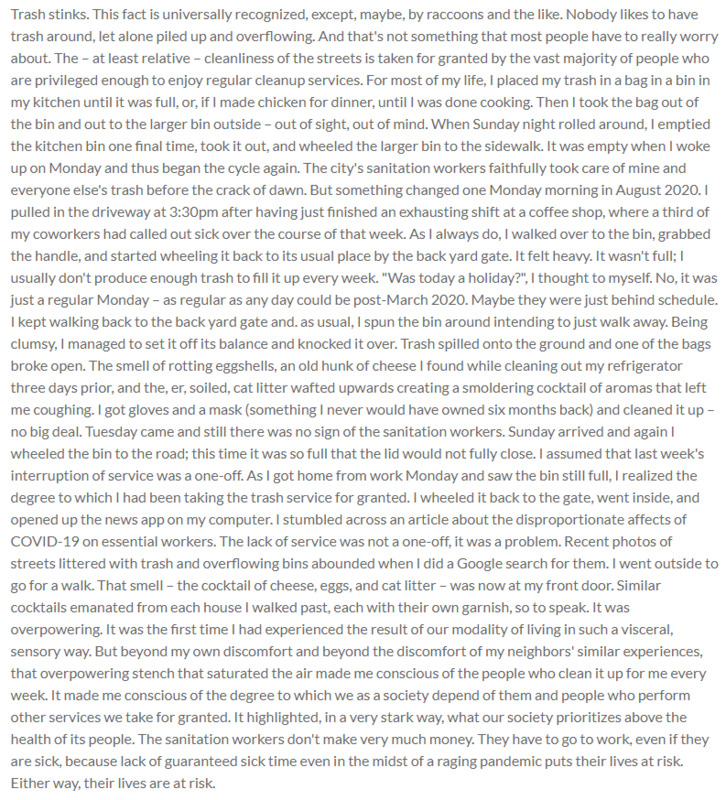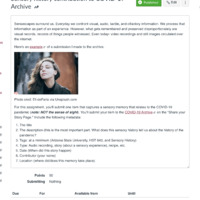Item
Smelling the labor shortage
Title (Dublin Core)
Smelling the labor shortage
Disclaimer (Dublin Core)
DISCLAIMER: This item may have been submitted in response to a school assignment prompt. See Linked Data.
Description (Dublin Core)
Trash stinks. This fact is universally recognized, except, maybe, by raccoons and the like. Nobody likes to have trash around, let alone piled up and overflowing. And that's not something that most people have to really worry about. The – at least relative – cleanliness of the streets is taken for granted by the vast majority of people who are privileged enough to enjoy regular cleanup services. For most of my life, I placed my trash in a bag in a bin in my kitchen until it was full, or, if I made chicken for dinner, until I was done cooking. Then I took the bag out of the bin and out to the larger bin outside – out of sight, out of mind. When Sunday night rolled around, I emptied the kitchen bin one final time, took it out, and wheeled the larger bin to the sidewalk. It was empty when I woke up on Monday and thus began the cycle again. The city's sanitation workers faithfully took care of mine and everyone else's trash before the crack of dawn. But something changed one Monday morning in August 2020. I pulled in the driveway at 3:30pm after having just finished an exhausting shift at a coffee shop, where a third of my coworkers had called out sick over the course of that week. As I always do, I walked over to the bin, grabbed the handle, and started wheeling it back to its usual place by the back yard gate. It felt heavy. It wasn't full; I usually don't produce enough trash to fill it up every week. "Was today a holiday?", I thought to myself. No, it was just a regular Monday – as regular as any day could be post-March 2020. Maybe they were just behind schedule. I kept walking back to the back yard gate and. as usual, I spun the bin around intending to just walk away. Being clumsy, I managed to set it off its balance and knocked it over. Trash spilled onto the ground and one of the bags broke open. The smell of rotting eggshells, an old hunk of cheese I found while cleaning out my refrigerator three days prior, and the, er, soiled, cat litter wafted upwards creating a smoldering cocktail of aromas that left me coughing. I got gloves and a mask (something I never would have owned six months back) and cleaned it up – no big deal. Tuesday came and still there was no sign of the sanitation workers. Sunday arrived and again I wheeled the bin to the road; this time it was so full that the lid would not fully close. I assumed that last week's interruption of service was a one-off. As I got home from work Monday and saw the bin still full, I realized the degree to which I had been taking the trash service for granted. I wheeled it back to the gate, went inside, and opened up the news app on my computer. I stumbled across an article about the disproportionate affects of COVID-19 on essential workers. The lack of service was not a one-off, it was a problem. Recent photos of streets littered with trash and overflowing bins abounded when I did a Google search for them. I went outside to go for a walk. That smell – the cocktail of cheese, eggs, and cat litter – was now at my front door. Similar cocktails emanated from each house I walked past, each with their own garnish, so to speak. It was overpowering. It was the first time I had experienced the result of our modality of living in such a visceral, sensory way. But beyond my own discomfort and beyond the discomfort of my neighbors' similar experiences, that overpowering stench that saturated the air made me conscious of the people who clean it up for me every week. It made me conscious of the degree to which we as a society depend of them and people who perform other services we take for granted. It highlighted, in a very stark way, what our society prioritizes above the health of its people. The sanitation workers don't make very much money. They have to go to work, even if they are sick, because lack of guaranteed sick time even in the midst of a raging pandemic puts their lives at risk. Either way, their lives are at risk.
Date (Dublin Core)
Creator (Dublin Core)
Contributor (Dublin Core)
Event Identifier (Dublin Core)
Partner (Dublin Core)
Type (Dublin Core)
text story
Link (Bibliographic Ontology)
Controlled Vocabulary (Dublin Core)
English
Emotion
English
Labor
English
Economy
English
Education--Universities
English
Home & Family Life
English
Health & Wellness
Curator's Tags (Omeka Classic)
Contributor's Tags (a true folksonomy) (Friend of a Friend)
Collection (Dublin Core)
Linked Data (Dublin Core)
Date Submitted (Dublin Core)
02/05/2022
Date Modified (Dublin Core)
02/10/2022
03/15/2022
03/25/2022
06/09/2022
Item sets
This item was submitted on February 5, 2022 by Luke Maldarella using the form “Share Your Story” on the site “A Journal of the Plague Year”: https://covid-19archive.org/s/archive
Click here to view the collected data.

